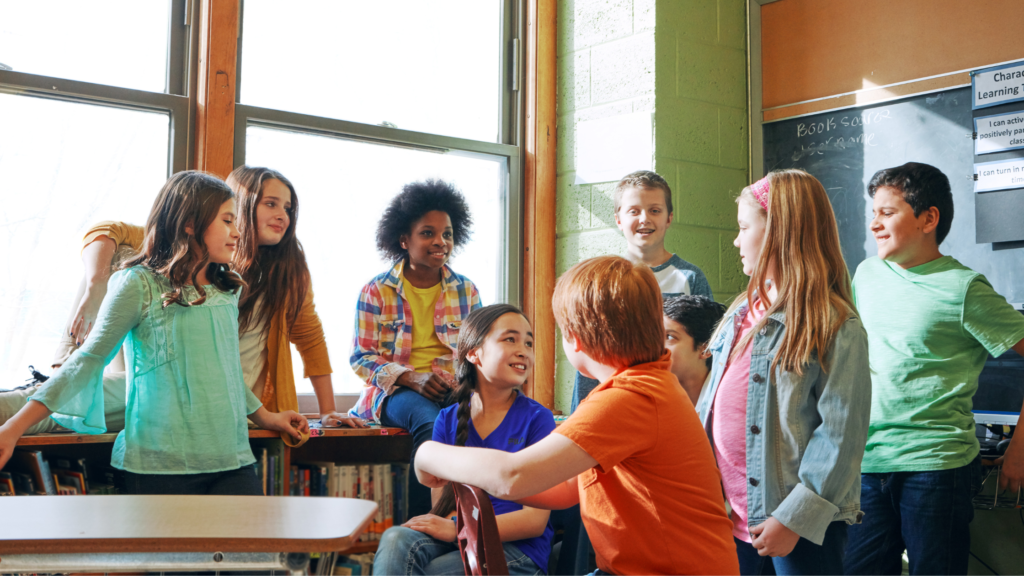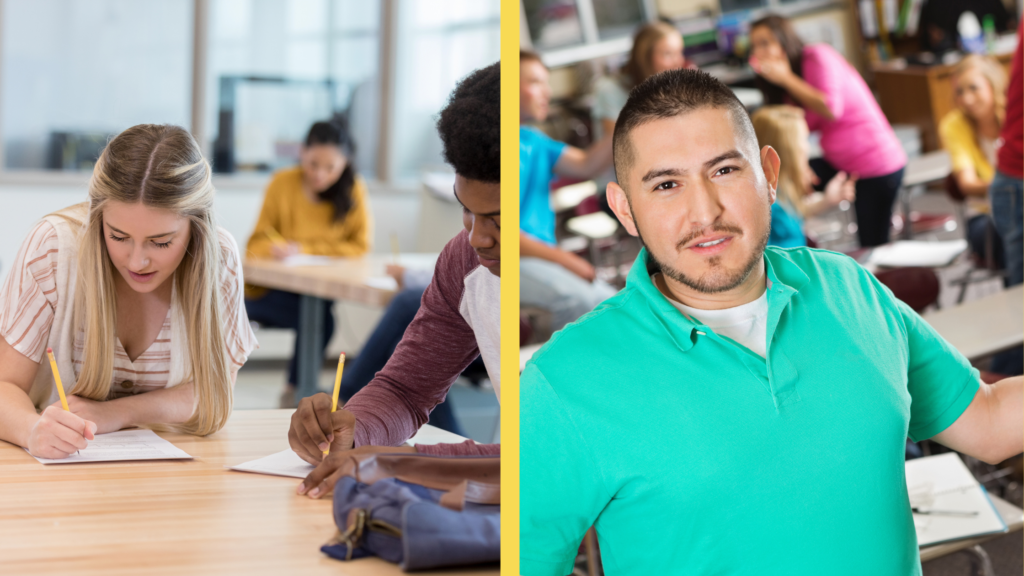Being a new teacher has its own challenges in the classroom. Add coaching responsibilities to the plate, and you have a recipe for exhaustion. Brittany Harley shares her experiences as a new teacher and coach at Taylor High School in Taylor ISD. She is also obtaining her certification through the Region 13 Educator Certification Program. Let’s tune into a conversation between Brittany Harley and Angela Isenberg, the host of our I’ve Tried Everything behavior podcast.
Angela: Hello. Welcome back to I’ve Tried Everything, a podcast focusing on behavior support in schools. I’m your host, Angela Isenberg, project coordinator at Region 13. Every week I talk with educators just like you. We cover some tough topics, share stories, and explore what works and what doesn’t. Let’s go.
I’m with Brittany. She works with high school students in Taylor ISD. So Brittany, tell me a little bit about the start of your school year. If you had to pick a song that sums up your first launch into education, what would that song be?
Brittany: Oh, very good question. I think that the best song that would kind of summarize my very first month of teaching would be Through the Fire and the Flames by DragonForce for a couple of reasons. First off, it’s super fast-paced, and I feel like I have been running at that fast pace nonstop since day one. So it’s also pretty intricate, and there is a lot of detailing in it.
Again, as you’re going into your first year, there have to be a lot of details in your day-to-day activities, your day-to-day scheduling, and your plans. It’s also super long. So I feel like these first six weeks have been about a year. Then lastly, of course, through the fire and the flames, we carry on, so that is exactly what I’m trying to do.
Angela: So, what hats do you wear at Taylor High School? What are the different things that you’re involved in right now?
Brittany: I am one of the biology teachers. There are two of us at Taylor High School. It’s a pretty small school. We’re only 4A. I also coach, so I am an assistant volleyball coach and an assistant softball coach. So I am pretty involved in all kinds of aspects of the school.
Angela: So let’s put on our volleyball coach hat for just a second. So tell me about the relationships that you have built with your volleyball girls at this point in time.
Brittany: Oh, it is just fantastic. I honestly look at them almost as my own kiddos. They are so much fun. They’re definitely all very different. They’re all very unique, and I’ve had the privilege of getting to work with them for even longer than just the school year because we actually started volleyball a month before school started. So it was nice because I was able to kind of build that relationship with them specifically earlier. A lot of these girls, I actually coached the freshman team to the JV B team, most of them are freshmen, and biology is a freshman course.
So a lot of these girls are actually in my classes as well, which makes it even better because I can kind of count on them and look to them as the leaders in class.
Angela: That’s great.
Brittany: So it has really, really helped, and they can kind of help spread my expectations from the court to the classroom and keep everybody else on track. It’s been wonderful. Yeah, I’m obsessed with my girls.
Building A Classroom Community

Angela: So, thinking about your class, let’s put on your biology teacher hat. What is something that you’ve done in the classroom at this point to build relationships or build a class community?
Brittany: For me, especially, I think that it has been really helpful being really reliable. I am quite a bit older than most of my students, but at the same time, I try in a way to be the cool teacher. I guess. So, for example, we just actually had homecoming week last week, and I made an effort to dress up every single day for homecoming. I took a lot of the time out of class to go around and compliment everybody on their outfits, their clothes, and their mums that they had. Just kind of be a little more relatable to them in that way. Something that they could look and feel like they’re kind of a part of. Like we are one and the same.
Angela: That’s awesome.
Brittany: That equality aspect. So I do that quite a lot. Then I just try really hard to do a lot of check-ins with all of my students and get to know a little bit about them on a personal level. I always start with the student survey at the beginning of the year. At least I did this year, and that really worked out. I took quite a lot of time out that first week to read them and dissect them and kind of get better at understanding some of the interests that my students have so that I can utilize that throughout the year in my class.
Angela: Oh, I love that. So you’re part of our Education Certification Program here at Region 13. Talk to me about the program. Has it been beneficial for you to be in Pam’s group? Pamela Pate is one of our specialists who is in charge of helping interns. How has that program helped you?
Brittany: Oh, Pam is just an absolute godsend, honestly. She is incredible. She is so supportive. She is full of knowledge, and one of my favorite things about being in this program specifically is that a lot of what we do is in-person versus being virtual. I understand that that can be kind of difficult to manage when you have a full class day as well as your school. But having the ability and the chance to actually be one-on-one connected with other teachers that are in the exact same shoes as you, going through the exact same issues and not being forced to talk to them through a screen or over the phone, but actually being in a room physically present with them kind of takes that to a different level and a deeper understanding. You have a deeper connection with them.
Honestly, you can kind of vent it out knowing that whoever you’re talking to is going through the exact same thing, and maybe they have some insights. So Region 13, for me, has been probably my favorite part about it. Not only that, but just the in-depth detail that this program goes into really helps us strategize and make sure that we have everything we need to be successful in our first year.
A lot of other programs don’t go into the depth and detail that Region 13 does. I know for me especially, having that extra little bit of support and that extra depth has really made a difference for me in my classroom.
Importance of Classroom Procedures

Angela: If you had to think of one strategy tip that maybe you took away from one of the classes that Pam has done in the ECP program or something that you learned in professional development at Taylor ISD, what is one tip that you feel like has been hands down one of the most beneficial things that put in place in your classroom?
Brittany: Going into this year, I didn’t realize the extent of policies and procedures and how important it is to have extremely structured policies and procedures in place in your class. Because, again, going into your first year of teaching, you don’t have any experience with any of this. You have no idea what’s going on. It’s just chaos. So it’s just things that you don’t think about that this program has touched on.
For me, that was the level of structure and the level of planning it takes not only for your curriculum but also for classroom management and the strategies and policies that you’ll have in place every day that are going to cause your classroom to run smoothly.
Angela: Setting the foundation around the classroom with policies and procedures is huge because that gives you something to move from. So I love that that’s been a big takeaway for you. I always think about that as setting the structure of success in your class because the other thing that you build on top of it, you have to have that so kids know how to enter your room, how to exit, what the process is whenever they’re doing certain activities and things in your classroom, so that’s big.
If you had to think about something that you wish you had known before you walked into the classroom, what is something that you wish you would have known before you started teaching?
Brittany: The biggest thing that I can think of is I didn’t realize I would have to teach such the basics of basics. Such as like, you just mentioned entering or exiting a room. You would never guess that a student would not understand how to properly walk into a room. I legitimately have had kids running into my room and knocking the desks over, sliding into the room like they were sliding into a baseball base. I wish I had known that the expectation was not only to teach these kids curriculum but also to teach these kids just how to act.
As a biology teacher, I teach freshmen, so these kids are 13 or 14 years old, and my goodness, do they act it. I definitely had a much higher expectation for their general behavior as humans. Not aliens or something crazy like they act like they are. But that would’ve been a little bit more helpful to know going into it. But again, Region 13 did a great job of preparing us for that, so.
Behavior Differences Between Classes

Angela: That’s awesome. So thinking about that behavior, what has been maybe the most challenging for you behavior-wise in the class?
Brittany: For me, my classes are all very different. For example, in my first period, I teach an eight-period day. My last period is athletics, so it doesn’t really count. But my very first period, that class was so dramatically different than my seventh period that I could not even sit here and compare the two.
Whereas my middle periods, four through sixth, are very, very well behaved where they’re zoned in best during the day. So trying to be super flexible and change my teaching strategy as well as change my behavior practices and method of implementing those throughout the day based on what class period I’m in is really, really difficult. Especially somebody like me, who I tend to be very structured. I don’t adjust well to change. It’s difficult for me to be that flexible and try to find ways to make that work best.
Angela: I know exactly what you’re talking about. I’m thinking about a year that I taught that I had a really challenging class period that stood out differently than my other classes. I really ended up having to completely rethink not only behavior management in that class but the curriculum in that class because they weren’t able to do some of the cooperative learning things that the other classes could do because they just didn’t have the behavior piece in place. So I’m just thinking of something simple like that if my classes were arranged in groups, the class before them would have to put the desks in rows, and the classroom after them would have to put it back into groups because they just couldn’t start or end the class period in groups. It just didn’t work well.
So I think you’re right. It’s being able to have that flexibility to say, man, this class is different, and I have to do something different with them. But then, how do you do that, and how do you make sure that that still flows with all the other things that you’re expected to do? It makes it so very challenging.
Brittany: Yeah, it’s impossible, honestly. Relating to you, I have the exact same situation. My seventh-period class is…I call it my controlled chaos. I have gone through every single teacher type, I guess you could say. The strict teacher, the fun teacher, the mean teacher, all of it, and I have yet to find one that works.
Angela: I would say hang in there. One of the things that I think we’re so quick to think is that, okay, if I just do this for a couple of days, it’s going to make a huge difference. Behavior change, if you think about it, takes time, and we don’t have that time. In education, it’s like how fast can you get things done? So I would say stick with something, give yourself a little bit more time to be able to see whether or not that’s going to pay off. Whether it is an approach that you do or something specific that you put into place. Research says three weeks, and I know you’re thinking, of my god, three weeks. How would I do that? That’s the thing with behavior. Am I making progress? It’s not about complete elimination behavior, but is it getting better, and how would I judge whether or not it’s getting better?
What would that look like? Would it look like the output of student performance? Would it look like I got through all the content that day, or I got through most of the content where before I was only getting through the very beginning of what I was doing? Now I’m almost to the point where I’m getting through everything that the other classes are doing. So however you judge progress, kind of think about that and then look at that from a holistic way instead of that behavior’s still happening. I’m super frustrated. It might still be happening, but is it getting a little bit better?
Brittany: Like I said earlier, I went through all the teacher types, and I have kind of found one that seems to be resonating a little bit better with that class. I’m kind of going into week two of that teacher style to see if it continues. We are, at least with that class in particular, it takes double the amount of time to get through anything.
As you mentioned earlier about being flexible, a ton of the privileges that other classes have, they simply don’t get because they can’t. I tell them, I said, “Y’all can’t handle it. So if we can’t handle it, then we can’t do it.” So that class has to be a lot more structured, and right now, it’s coming down to letting them be a little rowdier and allowing that to happen as long as the rowdiness is staying on topic. That seems to be right now what is resonating best and at least keeping them engaged in discussions. So that’s kind of what I’m sticking to. We’ll see what week two holds.
Angela: Awesome. Well, Brittany, I really appreciate you being with me, and I wish the best of luck for you throughout this first year of education and good luck to your girls in volleyball. Hopefully, you’ll have a great season. So thank you very much. I appreciate everybody tuning in for I’ve Tried Everything, and we’ll see you next time.
Explore our Behavior page to learn how we help educators improve behavior management knowledge, skills, and practice.
Angela has 24 years of experience in education. She has been in her current position for 12 years. Angela has trained and provided coaching support to over 200 campuses for PBIS. She is also a certified Restorative Practices coordinator. She is a trainer for Interventions, Coaching Classroom Management, CHAMPS, and Why Try.






Add comment